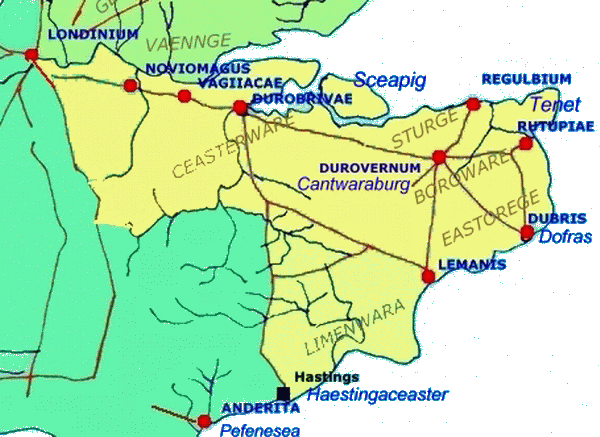The Jutes have no recorded history on the continent but the fact that Venantius Fortunatus mentions them as being "beside the Dane and the Saxon" supports the view that they were the original inhabitants of Jutland (Danish Jylland). In the Old English poem Beowulf a people called the Eotens figure in war with the Frisians and as a refuge for an exiled Danish king.
If Eotens can be identified with the Jutes this is further evidence that their home was in Scandinavia close to the Danes. In old Norse Jotar is the name given to the Danes of Jutland. Some Jutes may have mingled with the Saxons in their continental expeditions and settlements because the Frankish king Theudibert I, writing to Justinian, mentions that he had Jutes (Eucii) in his kingdom.
Bede states that the Jutes settled Kent, the Isle of Wight and parts of Hampshire.  What is known of the early social structure of Kent indicates that its settlers were different from those of the adjacent regions. Finds in Wight show strong similarities with artifacts found in Kent from the settlement period. In Hampshire place-names indicate the present of the Jutes. Kings of the Jutes however, always refer to themselves as 'kings of the Angles' and there can be no doubt that the Jutes had strong affinities with the Angles, their immediate neighbours on the Continent.
What is known of the early social structure of Kent indicates that its settlers were different from those of the adjacent regions. Finds in Wight show strong similarities with artifacts found in Kent from the settlement period. In Hampshire place-names indicate the present of the Jutes. Kings of the Jutes however, always refer to themselves as 'kings of the Angles' and there can be no doubt that the Jutes had strong affinities with the Angles, their immediate neighbours on the Continent.
In describing the death of William Rufus in the New Forest, Florence of Worcester mentions that the forest was called Ytene, 'Jute land'.
Kentish dialectical links to Frisian probably arose during intercourse after the settlement period.